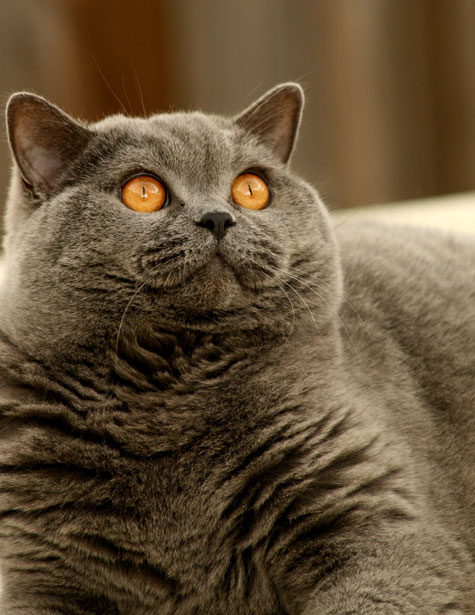British Shorthair is a stocky, muscular cat with an easy-going demeanor. Befitting her British roots, this cat is somewhat reserved, has a quiet, and tends to be an undemanding companion. However, it can be quite affectionate once he gets to know her family more. This cat has a mellow nature, gets along just pretty well with other members of the household. While they may not reach out to their owners often for cuddles, they will always be glad to have some good snuggles once in a while.
Origin of the British Shorthair
As her name suggests, the British Shorthairs hail from Britain. However, these cats actually have a Roman heritage. As the Roman Empire invaded Britain, they brought cats to fend off rodents from their food supplies, and soon these cats colonized Britain’s streets for centuries.
In the late 1800s, Harrison Wier, domesticated these British street cats through selective cross-breeding and created the British Shorthair present today. Through his work, he was named the breed’s father and deemed to be the first professional cat breeder.
British Shorthairs were almost placed into oblivion during World War II. Fortunately, the breed’s remaining members were crossed with other cat breeds, which have preserved their lineage.
The American Cat Association was the first to acknowledge the breed in 1967, followed by International Cat Association in 1979 and the Cat Fanciers Association a year after.
Physical Characteristics of the British Shorthair
- Length: 22 to 25 inches
- Weight: 12 to 18 pounds (Males), 9 to 15 pounds (Females)
- Life Expectancy: 12 to 17 years
- Coat Color: Blue, black, red, smoke, silver, golden, white, cream, with an array of shadings and patterns
- Type of Coat: Short, dense, plush
- Eye Color: Blue, gold, copper, odd-eyed
British Shorthairs are fairish-sized to large cats. They are powerful, muscular, and boast a heavy boning structure, accentuated by a rounded, thick look.
Their features are well-developed as robust cats, such as having strong jaws, a prominent muzzle, a muscular neck, a broad chest, and thick and strong legs. Like their ancestors, they look like a cat supposed to ward off rodents at houses and farms. Their coat is thick and dense, with a relatively hard texture, serving as its protection.
British Shorthair Personality
British Shorthairs are in the middle of everything when it comes to their nature. They are active and playful, but not too vigorous. They can be affectionate, but will not demand their master’s attention. Blessed with smarts, but will not open cabinets or refrigerators to display their wit.
These felines have an easy-going and mellow nature. Once they settle in and have broken through their initial reserve, they can be loyal furballs, following their owners around the house to observe whatever you are doing. They spread their affection to all family members, instead of picking one particular person with whom to bond. They are calm and would be happy to sit beside their family members in front of the television.
While British Shorthair would not demand attention, they surely appreciate a few petting stokes once in a while. However, they are still not “lap cats” and would take a happy life curling beside you or on your feet. As a big cat, they are not fond of being picked up and carried around. They would detest such activity and will forcibly stretch their legs to push you away.
In terms of activity, they have a moderate energy level. They are most energetic during their kittenhood but will tone down as they age.
These cats tend to go along well with cat-friendly dogs and pets, as long as they are properly introduced. They also go incredibly great with children, and toddlers love them in return. As for guests, these felines would not hide under the bed and would greet guests happily.
Caring for the British Shorthair
British Shorthairs have dense, plush, short fur, and boast the most hair per square inch than all other feline breeds. With that, brushing a few times in a week will help remove debris, dander, and loose hair from their coat, and keep it in top condition. During spring, they tend to shed more fur in preparation for their winter coat, which may require more frequent brushing. Other grooming needs include weekly dental brushing to avoid periodontal disease, nail trimmings, and ear cleaning.
These cats have moderate activity levels. Given their big size, they are not known as climbers and jumpers. Truth to be told, British Shorthairs have a reputation of being couch potatoes, which is why it is vital to engage them in both physical and mental activities through hands-on playtime or interactive toys.
When it comes to children and pets, these felines are relatively tolerant and accepting, as long as they are treated with respect. Children must be taught not to hold these cats forcibly. It is better to have them pet these cats on the floor, rather than picking them up and carrying them. Other pets, especially dogs, must be prevented from harassing or interfering in these cats’ personal space, as they value their dignity.
These cats are generally healthy and are not known to experience many genetic issues. Getting recommended vaccinations, preventive medical care, and regular checkup are good ways to keep them healthy.
British Shorthairs are perfect for those owners who are looking for less active, reserved, and undemanding companions. But, while these cats love to keep a low profile, don’t be deceived as they are more than willing to repay the affection to families that would add them to their lovely homes.

